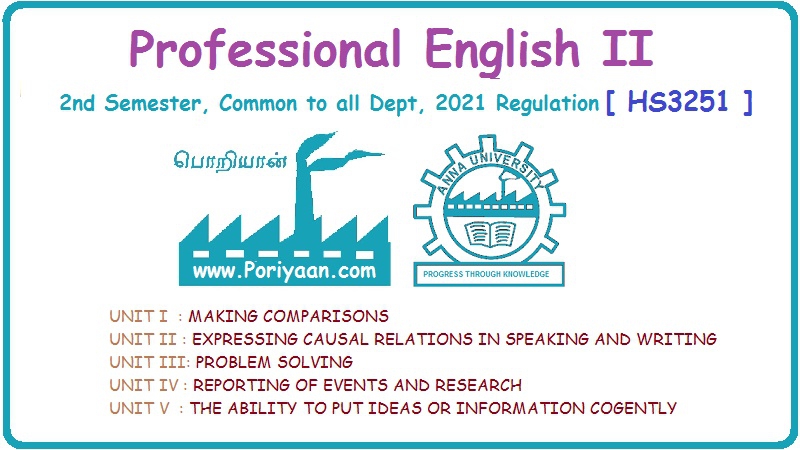Professional English: Writing: UNIT 1
Compare and Contrast Essay
Writing | Professional English
A compare-and-contrast essay is a kind of essay that points out the similarities and differences between two or more subjects. It is an ideal kind of essay for showing what separates and unites the related things or concepts.
CHAPTER – 2
COMPARE AND CONTRAST ESSAY
A
compare-and-contrast essay is a kind of essay that points out the similarities
and differences between two or more subjects. It is an ideal kind of essay for
showing what separates and unites the related things or concepts.
Compare-and-contrast
essays have a lot in common with other essay types. By seeing the differences
and similarities, the reader better understands each of the subjects. They are
highly useful for learning details with a comparative perspective.
In
this chapter, we explain how to write a compare-and-contrast essay, including
some advanced tips and examples. We discuss how to structure your points.
Purpose of a compare-and-contrast essay
If
you wish to understand the renewable sources of energy clearly, it can be
compared to non-renewable sources of energy. It should be written in such way
that it should not confuse the readers.
Unlike
argumentative essays or persuasive essays, compare-and-contrast essays deal
with multiple topics instead of focusing on one. They show the instructor how
well you grasp both subjects.
How to write a compare-and-contrast essay
First
things first: You need to choose which subjects you're comparing.
Some
of the compare-and-contrast essay topics:
Opposing options of certain categories:
❖ Renewable resources and non-renewable
sources of energy.
❖ Home made fruit juices and tinned cool
drinks.
❖ Books and television
❖ Yoga and physical exercises
Topics related to art or cultural movements
❖ Vocal music and instrumental music
People who are similar, connected, or associated with each other
❖ Rajinikanth and Kamalahasan
The state of affairs at different time periods
❖ India before and after independence
Two different but related places
❖ Delhi and Mumbai
Opposing theories or beliefs
❖ Evolution and Creationism
Opposing viewpoints or opinions
❖ Caste Reservation or Merit based
allotment
Topics that are often confused with each other
Oppression
and Subjugation
Try
making a Venn Diagram which is a visual aid that helps you understand which
characteristics are common and unique.
Organization
Compare-and-contrast
essays follow our own essay structure but it should follow a simple format of
beginning, middle, and end:
•
Introduction: your topic of discussion
•
Body/Contents: where you actually list the similarities and differences
of your subjects.
•
Conclusion: Summation of your points
The
introduction, usually one or two paragraphs, should include a thesis statement
to show the reader what to expect from the rest of your essay.
It's
the body where compare-and-contrast essays get tricky. One by one comparing or
switching back and forth needs coherent thinking.
How to structure a compare-and-contrast essay
The
hardest part of structuring a compare-and-contrast essay is knowing when to
talk about which subject. We have three options:
•
Block method (subject by subject): You discuss one
subject in full and then move on to the next subject.
•
Alternating method (point by point): You discuss one aspect after
another aspect of two subjects. Eg. Electricity consumption of AC and Room
Cooler.
•
Similarities and differences: You discuss all the similarities between
your subjects and then all the
differences, or vice versa (differences first and then similarities).
Block method (subject by subject)
The
block method is usually divided into paragraphs: a paragraph about one subject
and then a new paragraph about another subject. bs
Alternating method (point by point)
As
another option, you can break paragraphs up by a specific topic and issue, and
in each paragraph discuss both or all subjects.
Similarities and differences
The
third option is quite similar to the alternating approach, with each subject
being discussed side by side in the same paragraph. However, the paragraphs
aren't divided by different topics, but instead by what the subjects have in
common and what they don't.
The writing process for compare-and-contrast essays
The
writing process is the same as all essay writing, although adapted specifically
for drawing comparisons:
Brainstorming
- List
all the similarities and difficulties by using a Venn diagram
Preparation
-
Look at your brainstorming lists and decide which structuring method should be
followed.
Drafting
-
Write and rough draft.
Revising
-
Identify the areas that need to be fixed, revised, or rewritten after finishing
rough draft.
Proofreading
-
Correct all the spelling and grammatical mistakes.
Professional English: Writing: UNIT 1 : Tag: : Writing | Professional English - Compare and Contrast Essay
Related Topics
Related Subjects
Professional English II
HS3251 2nd Semester 2021 Regulation | 2nd Semester Common to all Dept 2021 Regulation
